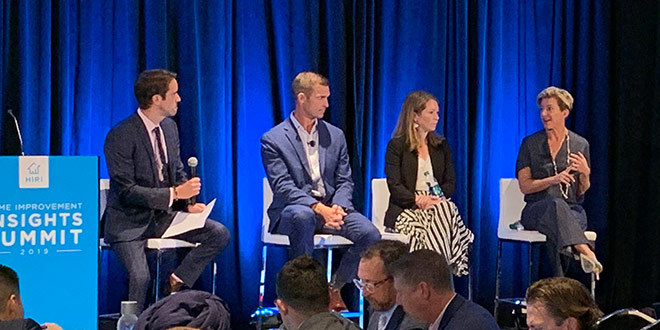At the 2019 HIRI Insights Summit, presented by the Home Improvement Research Institute (HIRI), a range of industry analysts explored how shifting consumer trends, new retail technology and labor shortages are affecting the home improvement market.
1. Despite uncertainty, the home improvement market is growing.
The first presentation, delivered by Grant Farnsworth, director of strategy for market research firm The Farnsworth Group, reassured attendees that despite mixed headlines and economic indicators, research shows spending on home improvement products grew to $405 billion in 2019, up 4.1 percent from spending in 2018. That figure is expected to rise through 2023.
2. 1 in 8 renovation projects addresses damage from natural disasters.
In the first keynote address of the session, Nino Sitchinava, PhD., principal economist of Houzz, says natural disasters are becoming more common. From 1980 to 1989, only three natural disasters caused more than $1 billion in damage. In 2018 alone, there were 14 such storms. 1 out of every 8 renovation projects intends to remediate damage caused by hurricanes, floods, fires or other natural disasters.
3. Big boxes say brick and mortar is here to stay.
Amy Anthony, senior director of customer strategy for Lowe’s, presented data on the continued importance of brick-and-mortar retail. Her data shows that only 3 percent of all home improvement products were purchased online in 2018, with more than 90 percent of those purchases taking place in a store. Anthony says 58 percent of customers believe a retailer who can give good information is more important than low prices.
4. Mobile purchases are driving e-commerce.
Brendan Baby, head of customer intelligence for Home Depot, says mobile commerce is growing at a faster rate than in-store shopping. He says that 50 percent of all of Home Depot’s Black Friday orders were done via mobile phone. Only 26 percent of current purchases at Home Depot are made via mobile devices, but the company expects that figure to grow to 40 percent by 2023.
5. Generation Z won’t settle.
Many retailers may be focused on serving Baby Boomers, Generation X and millennials, but Therese Caruso, managing director of global strategy and insights for Zeno Group, says Generation Z is completely different. She says the 90.3 million people born after 1996 currently have about $143 billion in buying power. To this generation, which Caruso calls Generation We, having a voice and making a difference are critical and influence their retail experience. They want retail leaders to be active in the communities they serve.
6. Retail experiences are increasingly vital.
Keynote speaker David Marcotte, senior vice president for Kantar, says retailers who excel with cross-channel content are the best positioned to capture future sales as retail experiences—not just transactions—grow more important. As consumers research products in the discovery phase of a purchase, finding new ways to help them visualize their purchase in their own home is paramount. Marcotte points to major paint manufacturers who allow users to transform their wall color via an app.
Take the Next Steps
These were just a few of the many presentations that highlighted the 2019 HIRI Insights Summit. For further insight into the event, check out the November issue of Hardware Retailing. For more information on HIRI research and events, visit the organization online.
 Hardware Retailing The Industry's Source for Insights and Information
Hardware Retailing The Industry's Source for Insights and Information








